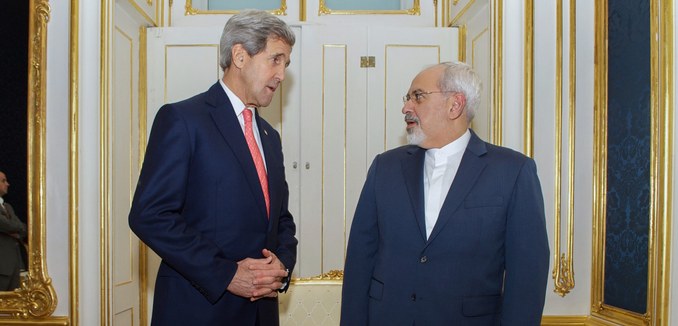Iranian Foreign Minister Mohammad Javad Zarif has rebuffed Secretary of State John Kerry’s call for Iran to negotiate a “new arrangement” governing its ballistic missile program.
Making his remarks in Tehran at a joint press conference with Estonia’s foreign minister on Sunday, Zarif rejected any form of negotiation or compromise. Zarif claimed that the nuclear deal reached last year did not cover other aspects of Iran’s defense programs.
Kerry said last week in a press conference with Saudi Foreign Minister Adel Al-Jubeir that “we’re prepared to work a new arrangement to find a peaceful solution to these issues, and we look for Iran to make it clear to everybody that they are prepared to cease these kinds of activities that raise questions about credibility and questions about intention.”
While the deal did not specifically address Iran’s ballistic missile program, United Nations Security Council Resolution 2231, which supported the deal, did. The resolution merely “called upon” Iran not to develop its ballistic missile capabilities, rather than demanding or ordering, which prompted the Islamic Republic, with Russian support, to deny that it was violating the resolution.
But Resolution 2231 also said that Iran must abide by previous Security Council Resolutions, which place restrictions on ballistic missile work for eight years. Iran has tested a number of ballistic missiles since last year’s nuclear deal. A missile launch in October which was found to be in violation of Resolution 1929. Iran announced the test launches of two more ballistic missiles last month, at least one of which had the inscription “Israel must be wiped from the face of the earth” written on it in Hebrew. Because of the dispute over the language of resolution 2231, the United States and the European Union stopped short of calling the launches a violation of the resolution.
Despite its connections to Iran’s nuclear program — a ballistic missile is needed to carry a nuclear warhead — Iran has consistently refused to limit its ballistic missile development.
Zarif, who laughed at U.S. negotiators when asked about ballistic missile restrictions last year, is one of several high-ranking Iranian officials, including President Hassan Rouhani, who have stated that Iran will refuse to accept any limits on its program. An editorial in The Wall Street Journal last month pointed out that Rouhani, although often described as a moderate, was in agreement with “hardliner” Iranian leaders in supporting Iran’s ballistic missile program.
[Photo: UNVIE U.S. Mission To International Organizations in Vienna / Flickr ]




